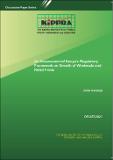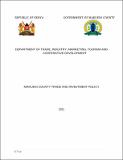Policy Brief No. 01 of 2022-2023 on Towards Effective Regulation of Wholesale and Retail firms in Kenya
Publication Date
2022Author
Type
Policy Briefviews
downloads
Metadata
Show full item recordBy
Karanja, John
Abstract/
The wholesale and retail firms are very significant in the country’s development process and, as such, the sector was identified as a contributor to the achievement of the Kenya Vision 2030 through job creation. That said, the growth of the wholesale and retail sector has been declining over the years, constraining its ability to contribute to job creation as envisioned by the Kenya Vision 2030. A key factor that influences the growth of the sector is the regulatory framework that has implications on growth of wholesale and retail firms. In addition, wholesale and retail firms play a major role in the economy due to their linkages with other sectors by providing readily available markets for products and services to consumers. The country has experienced an increase in wholesale and retail firms, a majority of which include supermarkets and hypermarkets, both local and foreign owned which continue to dominate domestic trade in Kenya. As a result, effective regulation of these firms is critical to enhancing the sector’s contribution to the improvement of livelihoods through job creation, particularly in the post-COVID-19 period, which is a major concern for the government in achieving the aspirations of the Kenya Vision 2030. The Constitution of Kenya 2010 devolved the function of regulation and development of wholesale and retail trade to the County governments. Specifically, the issues of market development, trade licences, and fair-trade practices were entirely devolved to County governments through the Fourth Schedule of the Constitution. Since the devolution of the wholesale and retail regulatory function to County governments, new charges such as county fees were introduced, and charges for the existing ones were increased, thus constraining the growth of firms. Further, the National government agencies also regulate the wholesale and retail firms where registration and incorporation of businesses are done by business registration service (BRS) domiciled at the Office of the Attorney General. In addition, the taxation of businesses is facilitated by the Kenya Revenue Authority (KRA) on behalf of the National government. Other national government agencies similarly regulate the sector depending on the type of business activity the firm is engaged in. As such, it is evident that the wholesale and retail firms are regulated by the two levels of government
Subject/
Wholesale and Retail Firms; Wholesale and Retail Sector; County Governments Regulations; Business Registration Regulation; Self-Regulation
Publisher
The Kenya Institute for Public Policy Research and Analysis (KIPPRA)Series
PB/ 01/2022-2023Collections
- Policy Briefs [161]
Related items
Showing items related by title, author, creator and subject.
-
Discussion Paper No. 257 of 2021 on An Assessment of Kenya’s Regulatory Framework on Growth of Wholesale and Retail Firms
Karanja, John (The Kenya Institute for Public Policy Research and Analysis (KIPPRA), 2021)The growth of wholesale and retail trade is significant in the development process and was identified as a contributor to the achievement of Vision 2030 through job creation. Its growth has been declining over the years ... -
Domestic trade regulation and growth of wholesale and retail firms: evidence from Kenya
Karanja, John Gakuu (Cogent Economics & Finance, 2022)The aim of this paper was to assess the effect of Kenya’s domestic trade regulations on the growth of wholesale and retail firms in Kenya. To achieve the study objective, the existing domestic trade regulatory framework ... -
Makueni County Arts, Trade and Investment Policy 2022
County Government of Makueni (County Government of Makueni, 2022)Trade and investment play a significant role in a country’s growth and development through their linkages with all the sectors of the economy by creating markets through which goods and services get to the consumer. Trade ...




